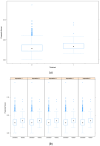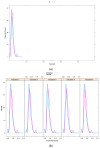Hospitalized Cancer Patients with Opioid Management for Chemo-Induced Ulcerative Mucositis Lessens the Patients' Overall Burden of Illness
- PMID: 40283971
- PMCID: PMC12030479
- DOI: 10.3390/ph18040536
Hospitalized Cancer Patients with Opioid Management for Chemo-Induced Ulcerative Mucositis Lessens the Patients' Overall Burden of Illness
Abstract
Objectives: Mucositis is a debilitating side effect of cancer therapy that adversely affects quality of life, cost of care, and the outcome of cancer therapy. Oral mucositis-related pain may be treated with numerous modalities but often includes opioids. The effects of opiate treatment on painful UM and its overall influence on the burden of illness (BOI) in cancer patients remain unknown. Methods: This study utilized the 2017 United States (US) National Inpatient Sample (NIS) database. The exposure was opioid treatment for chemo-induced ulcerative mucositis (UM), oral mucositis-induced pain, and the main outcomes included in-hospital mortality and BOI, length of hospital stays (LOS), and total hospital charges. Multivariable regression analysis was used to examine the relationship between outcomes and the key independent variable, opioid use, adjusting for propensity scores. Results: In the propensity score-adjusted analysis, UM patients with opioid treatment had 0.51 times lower total charges (95% CI: 0.42-0.76) and 0.67 times shorter LOS (95% CI: 0.51-0.87) than the UM patients without opioid treatment. However, there was no association between opioid treatment and in-hospital mortality. In the sensitivity analysis, the effect estimates were comparable in the propensity score-adjusted analysis, the decile-adjusted model, and the full model with the non-propensity score estimated method. Conclusions: Cancer patients with chemotherapy-induced UM-prescribed opioid analgesics for treating pain are associated with a lower BOI. Opioid pain medications are commonly provided to cancer survivors; estimating the BOI among them is crucial in supportive care research.
Keywords: burden of illness; chemotherapy; in-hospital mortality; opioid; oral mucositis; propensity score estimation.
Conflict of interest statement
The authors declare no conflicts of interest.
Figures





References
-
- Rosenthal D.I. Consequences of mucositis-induced treatment breaks and dose reductions on head and neck cancer treatment outcomes. J. Support. Oncol. 2007;5((Suppl. S4)):23–31. - PubMed
-
- Coelho L.H.M., Silva C.L.A., Pedra R.C., Rosado L.P.L., Verner F.S., Aquino S.N. Probability of oral complications of radiotherapy and chemotherapy for head and neck cancer. Gen. Dent. 2021;69:70–74. - PubMed
-
- Bhide S.A., Gulliford S., Fowler J., Rosenfelder N., Newbold K., Harrington K.J., Nutting C.M. Characteristics of response of oral and pharyngeal mucosa in patients receiving chemo-IMRT for head and neck cancer using hypofractionated accelerated radiotherapy. Radiother. Oncol. 2010;97:86–91. doi: 10.1016/j.radonc.2010.08.013. - DOI - PubMed
Grants and funding
LinkOut - more resources
Full Text Sources

